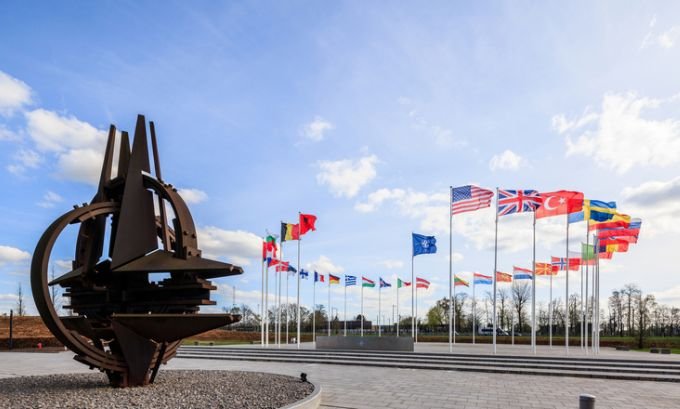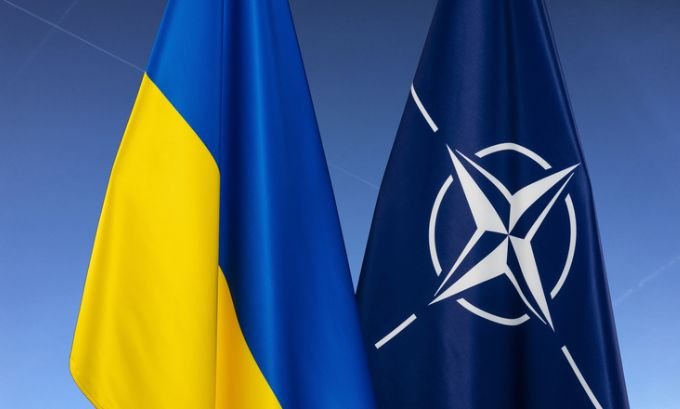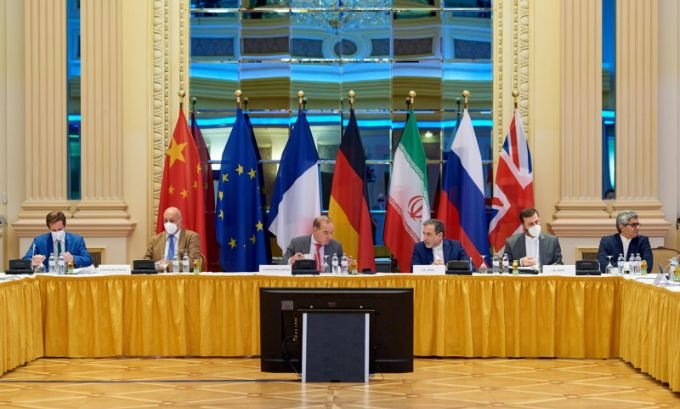Since the early 2000s, Ukraine has pursued a closer relationship with the North Atlantic Treaty Organization (NATO), viewing membership as a key to long-term security. The desire to join the alliance has only intensified since Russia’s full-scale invasion in 2022. For many Ukrainians, NATO membership represents a definitive break from centuries of Russian influence and a guarantee of national sovereignty.
This guarantee is rooted in NATO’s principle of collective defense, outlined in Article 5 of its founding treaty. It states that an attack on one member is considered an attack on all, a powerful deterrent that has maintained peace among its members for over 70 years. Despite widespread sympathy and significant military support from many NATO allies, Ukraine’s path to membership is currently blocked. The ongoing war with Russia makes immediate accession impossible, and this article will explain why.
Table of Contents
NATO’s Open Door Policy (With Conditions)
NATO has an “open door policy,” meaning any European nation can apply for membership. However, joining isn’t as simple as just signing up. Prospective members must meet a rigorous set of political, economic, and military criteria outlined in the Membership Action Plan (MAP). The goal is to ensure that new members strengthen the alliance.
Key requirements of the MAP include:
- A stable democratic system: This includes a commitment to the rule of law, individual liberty, and a functioning market economy.
- Civilian control of the military: The armed forces must be under the firm control of a democratically elected government.
- Respect for international law and borders: Candidates must have peaceful relations with their neighbors and resolve any outstanding territorial disputes.
- Ability to contribute to NATO’s defense: Members must maintain sufficient military capabilities to contribute to the collective security of the alliance.
Ukraine has made significant strides in these areas, especially in modernizing its military to meet NATO standards. However, several major obstacles remain, with the most significant being the active war on its territory.

The Barriers to Ukraine’s Immediate Membership
While many NATO members support Ukraine’s eventual membership, the consensus is that it cannot happen while the country is at war. Here are the primary reasons why.
1. The Active War with Russia
The most immediate and insurmountable obstacle is the ongoing conflict. Admitting a country that is already at war would automatically trigger Article 5. This would obligate all 32 NATO members—including the United States, the United Kingdom, France, and Germany—to come to Ukraine’s defense. In effect, this would mean entering into a direct, declared war with Russia, a nuclear-armed state. NATO’s current strategy is to support Ukraine’s self-defense without becoming a direct combatant, thereby avoiding a much larger regional or global conflict.
2. Unresolved Territorial Disputes
Even before the 2022 invasion, Ukraine faced significant territorial challenges. Russia illegally annexed the Crimean Peninsula in 2014 and has occupied parts of the Donbas region for over a decade. NATO has a long-standing policy of not admitting countries with unresolved territorial disputes, as this could draw the alliance into pre-existing conflicts. Until Ukraine’s sovereign borders are restored and internationally recognized, this issue will remain a major roadblock.
3. The Risk of Uncontrollable Escalation
Bringing Ukraine into NATO now carries the risk of escalating the current conflict into a catastrophic war between nuclear powers. Russian leadership has repeatedly warned that it views NATO expansion, particularly to include Ukraine, as a direct threat to its security interests. While this was a pretext for its invasion, admitting Ukraine during the war would be seen by Moscow as a major provocation, potentially leading to a direct confrontation that could spiral into a third world war. NATO leaders are focused on containing the conflict, not expanding it.
4. The Need for Full NATO Consensus
NATO decisions, including the admission of new members, require the unanimous consent of all existing allies. While many countries, particularly those in Eastern Europe like Poland and the Baltic states, are strong advocates for Ukraine’s swift membership, others are more cautious. Nations like Germany, Hungary, and Turkey have expressed concerns about provoking Russia further or being drawn into a wider war. Without a unified agreement from every member, Ukraine’s application cannot move forward.
5. Ongoing Reforms in Ukraine
While Ukraine has made remarkable progress in fighting corruption and strengthening its democratic institutions—especially under the pressures of war—the reform process is not yet complete. NATO requires members to have deeply embedded democratic values and robust governance structures. Allies will want to see these reforms fully consolidated and proven sustainable after the conflict ends before granting membership.
NATO’s Current Support and Ukraine’s Alternatives
Although membership is off the table for now, NATO and its allies are providing unprecedented levels of support to Ukraine. This includes billions of dollars in military aid, advanced weaponry, intelligence sharing, and extensive training for Ukrainian soldiers. NATO has also formally recognized Ukraine as a “close partner,” and the NATO-Ukraine Council provides a forum for joint consultations and decision-making.
In the absence of full membership, Ukraine is pursuing other security arrangements:
- Bilateral Security Guarantees: Several countries, including the U.K., France, and Germany, have signed bilateral security agreements with Ukraine. These pacts commit them to providing long-term military and financial support, though they fall short of the mutual defense clause of Article 5.
- European Union Integration: Ukraine is on a path to joining the European Union, which has its own mutual defense clause. While not as robust as NATO’s, EU membership would further anchor Ukraine in the Western political and economic sphere.
- Continued Military Modernization: With Western help, Ukraine continues to transform its armed forces to be fully interoperable with NATO armies, adopting their standards, tactics, and equipment.

A Path Forward Still Exists
The reality is that Ukraine cannot join NATO while it is fighting for its survival against a Russian invasion. The risk of triggering a direct war between NATO and Russia is too high a price for the alliance to pay.
However, this “no” is a “not now,” rather than a “never.” NATO leaders have repeatedly affirmed that Ukraine will become a member of the alliance in the future. The path to membership will only become clear after the war ends and Ukraine’s territorial integrity is addressed. For now, the focus remains on ensuring Ukraine wins the war and survives as a sovereign, democratic nation.
Frequently Asked Questions
Why can’t Ukraine join NATO during the war?
Ukraine cannot join NATO while at war because its membership would immediately invoke Article 5, obligating all NATO members to enter into a direct military conflict with Russia. This would risk a catastrophic escalation between nuclear-armed powers.
Has NATO officially promised Ukraine membership?
Yes. At the 2008 Bucharest Summit, NATO declared that Ukraine “will become a member.” This promise has been reiterated many times, but no formal invitation or timeline has been offered.
Could Ukraine join NATO after the war ends?
It is possible. Membership after the conflict would depend on the war’s outcome, the resolution of territorial disputes, and Ukraine’s continued progress on democratic and military reforms. Unanimous agreement from all NATO members would still be required.
What is Article 5, and why is it so important?
Article 5 is the cornerstone of the NATO alliance. It establishes the principle of collective defense, stating that an attack on one member is an attack on all. This powerful deterrent is the main security guarantee that NATO membership provides.
Do all NATO members support Ukraine joining?
There is no complete consensus yet. Eastern European members like Poland and the Baltic states are strong advocates for Ukraine’s membership. However, other members, including Hungary and Turkey, have been more cautious, fearing it could provoke further Russian aggression.
Is Russia’s opposition the main reason Ukraine isn’t in NATO?
Russia’s staunch opposition and its actions are major factors, but they are not the only ones. The primary obstacle right now is the active war on Ukrainian territory and the risk of escalation that admitting a country at war would entail.

